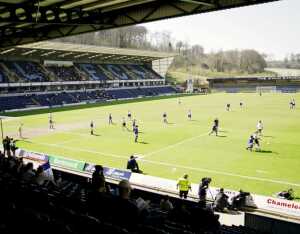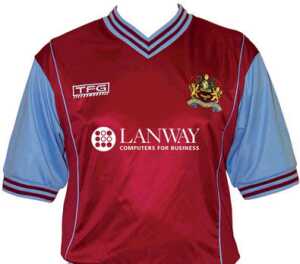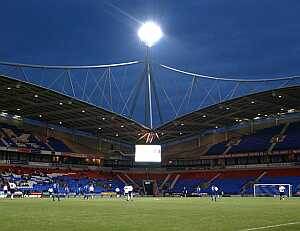|
It is indicative of a trend which runs throughout the game. Only at the top, with the most famous individuals, can players be bought not for footballing prowess, but for their marketing potential. At lower levels, the obsessive drive to maximise commercial revenues is manifesting itself in a variety of ways.
New stadiums in Leicester, Southampton and Bolton – to name just three – are named after commercial partners. Now, Wycombe Wanderers, resident at their Adams Park Stadium for over a decade, have announced a deal to rename the ground ‘the Causeway Stadium’, after sponsors Causeway technologies. At Gillingham, Paul Scally has been forced into a partial u-turn after he attempted to change the club colours to suit a sponsorship deal. Burnley have opted to split their shirt sponsors next season, with the result that they are virtually certain to shun Claret and Blue for every away game next season.
The Wycombe deal has evoked an impassioned plea from their supporters. The name Adams Park had significant links to the club’s history – Frank Adams had donated the club their previous Loakes Park home in 1947 in a move which guaranteed that the then non-league club had a future. In an open letter to supporters, Causeway admitted that the club’s directors had completed the move despite being aware fans would react angrily. Alan Parry, who is a director of the club, has spoken out against his boardroom colleagues – stating that despite the club’s protestations, the deal was not needed to ensure the club avoided administration. Parry also argued that a club renaming a stadium they had already inhabited for some time set a new precedent, and that ground name, along with club name and shirt colours, ought to be sacrosanct.
|
Burnley, like Wycombe, appeared to have weathered the brunt of the financial shockwaves reverberating throughout the game without needing to resort to such moves. Yet it is clear that simply to describe the decision as one of heritage versus commercial gain is for too simplistic.
Fans demand success. That is clear by looking at the messageboard on this site, and the expectations of the quality of player which the club should be bringing in this summer. Burnley do not have the resources of other clubs. They do not have a sugar daddy, they do not have the support of some clubs, and they are not imbued with any great assets cash in upon. Therefore, in order to stand still in relation to other clubs, Burnley must be creative in maximising their revenues.
This highlights one essential characteristic of all true football fans. We are greedy, demanding, and often have demands which are difficult to reconcile. We want success, are never quite satisfied with our position, yet we are fiercely loyal to the traditions and heritage of our club. We demand that they be upheld at all costs.
But we also refuse to bear the cost of respecting the past and improving the present ourselves. We give what we can, but we reach a point where we refuse to give any more, or simply can’t afford to.
Me, I want the Clarets to play in Claret and Blue whenever it does not clash with the home team’s strip. I would also like us to sign a quality first division midfield general, preferably with a bit of experience at the top level but who is young enough to improve, and I’d also like a commanding centre half. At the same time, I have registered before that I feel the club has gone as far as it can in squeezing cash out of the fans.
|
The difficulty is compounded by the knock-on effect of such deals. As Wycombe do it, somewhere another club is left behind, and they need to find a way to catch up with Wycombe again. Then someone else is left behind. Causeway Technologies claimed that within ten years most stadiums in the country will carry a sponsor’s name. I hope that is wrong, but if it transpires to be true, then the reason will in part be because Wycombe – or perhaps the first club to move to a new stadium which was named after a company – gained a slight advantage which every other club then sought to overcome.
Wycombe, surely, have spread the commercial net too far. But as for Burnley, the question of whether Barry Kilby, Andrew Watson et al have gone too far is one I struggle to answer. I think that on balance I can understand and accept the club playing in grey away from home next year to promote Vodka Kick, if it helps us build a competitive side next year.
But I do worry that the minute this becomes accepted practice, it is only a short step to other measures becoming acceptable. It is imperative that it is not allowed to go any further. Clubs have pushed this to the limits of acceptability, and rules should be imposed to uphold the history and traditions which give every club a character that it can be proud of. For the time being, clubs must balance the issues for themselves. And in doing so, the concerns of the fans, in every respect, must be considered.



